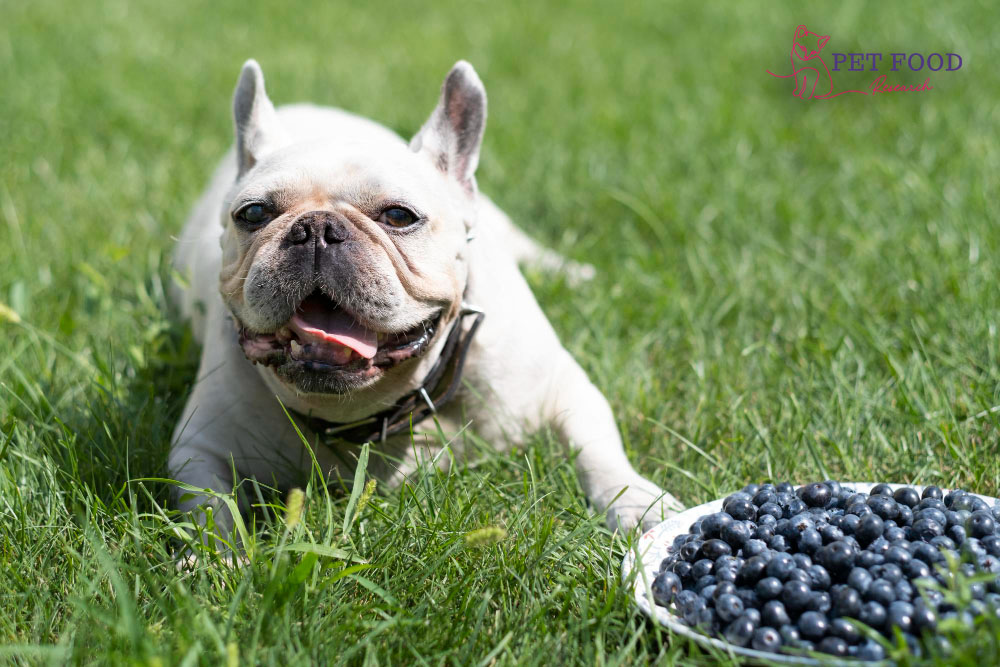Can Dog Eat Blueberries
Blueberries are nutritious, wholesome, juicy, and bite-sized fruits that are mostly consumed as human food. You as a dog owner ever wondered can my furry friend eat berries like blueberries? your dogs. In this article, we will dive into the wonders of blueberries for your dog, their benefits, serving size, and many more.
Are Blueberries Healthy for Your Dog?
If are you worried about the diet of your dog and hesitate to add new food to its diet like can dog eat blueberries, then it will be beneficial to add blueberries to your dog’s diet. These are healthy, nutrient-rich, and contain more antioxidants which will be safe and nutritious for your furry friends. Your dog will enjoy blueberries as a treat and will gain nutrition and health benefits in addition.
Nutritional Profile and Health Benefits of Blueberries
Blueberries are naturally packed with essential and healthy nutrients like vitamins, minerals, phytochemicals, and antioxidants. The nutrients present in blueberries include calcium, potassium, magnesium, manganese, and phosphorus among the minerals. While among vitamins, blueberries are rich in vitamin C, vitamin A, and vitamin K.
Vitamin and Mineral Profile
These provide enormous health benefits to dogs like vitamin C and vitamin A that act as antioxidants and provide immunity to your dogs to fight infections and are good for their skin health. Vitamin K prevents excessive blood loss and clogs the blood when your dog gets injured. Potassium and magnesium work along with calcium for the maintenance of bones and teeth and also contribute to other metabolic processes.
Anthocyanins
Other antioxidants present in can dog eat blueberries include anthocyanins. It is a free radical inhibitor, as it kills the free radicals and prevents oxidation of cells. So, anthocyanin is an immunity booster for your dog and prevents it from chronic diseases caused by free radicals.
Fiber Content
Blueberries also contain fiber which is beneficial for proper digestion. It helps in healthy bowel movement and prevents constipation and other gut problems. Overall, blueberries provide good nutrition to your dogs and make them healthy and free of infections and diseases.
How to Serve Blueberries to Your Dog?
- Blueberries are a treat for your dogs and treats should not include more than 10% of your dog’s normal diet
- You can feed blueberries daily to your dog if it likes and enjoys eating blueberries but give in moderate amounts and don’t overfeed.
- Always choose fresh blueberries, and avoid giving canned or packed fruit.
- Before feeding wash them properly to remove dirt, pesticides, or other contaminants, and remove the stem to avoid choking hazards in your
- If your dog is a small baby, cut or mash the blueberries and then feed it to prevent a choking hazard
- The serving size of the blueberries depends on your dog’s age, size, and dietary needs. So, before feeding consult with a veterinarian to determine the appropriate serving size for your dog
- For small puppies, 1-3 blueberries make a good treat and are more than enough for a daily diet. While for large dogs a small handful of blueberries should be enough
- After feeding, if you feel any behavioral change or discomfort shown by your dog, consult with a veterinarian to prevent major health problem
Health Risks from Blueberries
Despite their nutrition and health benefits, can dog eat blueberries can pose some health risks to your canine friend if they are not feeding according to their need and recommendations. Health risks may arise due to some reasons:
Overfeeding
Every food should be given in moderate amounts to your dogs, blueberries should also be given moderately. If you overfeed blueberries to your furry friend, these may cause digestive issues like diarrhea, their more fiber content is not needed by your dogs, and can cause irritable bowels and other gastrointestinal problems if fed in over amount.
High Sugar Profile
As fruits are sugary and sweet, they should be given in small or moderate amounts to your dogs. If fed excessively, their sugar content can harm your pup’s health. The high amount of sugar can cause digestive issues, diarrhea, dental carries, and overweight in your dogs. If your dog is suffering from diabetes or other metabolic disease, limit the intake of blueberries and don’t give it to your dog as a daily diet.
Intolerance
Some dogs may not tolerate blueberries as a food and show some allergic reactions but in rare cases. So, always try any new food in a small amount and add it gradually to your dog’s diet. If it shows some allergic reactions like itching, vomiting, diarrhea, or behavioral change after eating blueberries, do not feed it again and eliminate it from its diet.
Risk of Choking
You should feed the dog’s food in an appropriate size so the blueberries. If you are keeping a puppy as a pet, give the blueberries in small size or mashed form and supervise while your pup is eating to avoid choking hazards.
Conclusion
Blueberries make a nutritious and juicy treat for your can dog eat blueberries as these are rich in many nutrients and provide health benefits to your canine friends. The vitamin, mineral, and antioxidant content of blueberries boost the immunity of your dogs by reducing the free radicals and also contribute to their bone and teeth health. Always feed your dog fresh and washed blueberries to prevent chemical or environmental hazards.
If your pet is a small puppy, give it blueberries in a small amount, in a small size, or in a mashed form to prevent choking hazards. Rarely, dogs may show allergic reactions after eating blueberries. In this case, consult with your veterinarian as soon as possible to minimize the symptoms and prevent serious health issues. Do not overfeed your dog with blueberries as these are sugary and also have high fiber content which can upset your furry friend’s digestive system and can cause other health conditions. Always supervise and monitor after feeding your dog with a new food like can dog eat blueberries and observe if any behavioral change is shown and also consult the veterinarian immediately.
Read also: Petfoodresearch









